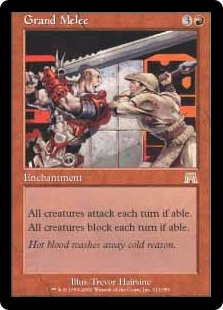From the very beginning, Magic: the Gathering has always been a constant battle between rival planeswalkers wielding giant fireballs and scores of brutish creatures. With over two decades of material to work with there are a myriad number of ways players can achieve this. Hordes of goblins, Eldrazi titans, sentient artifacts – chances are if you think of some fantasy-laden angle in which you want to attack your enemy, this game has a way.
That doesn’t mean all paths are created equal, however.
Simply put, although you may enjoy your time playing with wonky and eccentric deck ideas – and I know I do – that doesn’t guarantee you’ll have the same odds as someone who has built a deck to be fast, brutal, and efficient. For many, how you defeat your enemy is just an exciting as actually doing so, and many of these take time and setup. For others, style takes a back seat to efficiency.
That said, due to the game’s constantly changing dynamic, what constitutes as top efficiency now isn’t the same as five years ago, and it’ll be different five years from now. (That’s the tournament scene in a nutshell, really.) For instance, while the old days of Magic were littered with kitchen table decks containing little or no creatures, you rarely see those decks outside of Legacy or highly tailored Commander decks nowadays. It’s been clear for years that they’re pushing to replace basic spells with creatures possessing Enter The Battlefield triggers instead in a concerted effort to leverage creature combat more. It’s understandable, and creatures certainly are fun for the majority of players.
Yet in multiplayer formats like Commander, combat usually comes down to who can get the biggest creature with an evasion ability to hit someone or to token swarm an opponent with overwhelming numbers. With enemies on all sides, creatures in most EDH decks aren’t ideal for you to lose unless you either a) have to, or b) ensure both attacker and blocker both die.
As one of those old fogies, one of the things I particularly enjoy about the Commander format is precisely that. I enjoy that games where creatures are important – but you aren’t constantly beaten over the head with their combat presence.
Admittedly, there is a tradeoff to this, which is that people whose creatures are there for defense or utility versus being a beatstick don’t tend to attack with them unless it’s safe to do so. Thus, combat in EDH is more about gauging timing and finding openings than straightforward fighting.
In some cases, this defensive posturing is essential to buying time. In many other instances, though, a creature-based detente is the result of the inherent political nature of multiplayer games. Perhaps this natural state works out in your favor. But…what if you don’t want that? What if instead you want to cut that more surgical aspect out of EDH entirely and let combat reign? Well then, look no further than this week’s card!
Today we have: Grand Melee

Name: Grand Melee
Edition: Onslaught
Rarity: Rare
Focus: Combat Manipulation
Highlights: Grand Melee is one of those cards where its implications far outstretch its printed text. On paper, this Red enchantment encourages what Red likes to do best: attack with wanton abandon. In a very real sense, it removes most creature-based defenses in one fell swoop. In practice, however, it serves multiple roles, depending on how you choose to leverage the card.
On the one hand, Grand Melee doesn’t just create holes in players’ defenses – it blows them wide open. Aside from creatures that are unable to attack due to things like summoning sickness, defender, or some tap ability, this makes the battlefield much more volatile and unpredictable. In tandem with a potent creature or 20, this simple and economical enchantment forces players to be more assertive while simultaneously playing on their heels.
Alternatively, Grand Melee can be used without any heavy tactical aspect in mind. For those who enjoy simply upending the system and throwing a wrench into games merely to cause chaos, this is one Red card that’s happy to oblige. It makes games much more whimsical, which certainly has its benefits. If you enjoy your whimsy with bayonets that is.
Be wary when wading in with Grand Melee, however, as many players don’t like their battle plans disrupted no matter the reason or what the outcome may be. For those prone to the receiving end of creature punishment or defensive players seeking to restore their board position, it – and you – can quickly become an easy target.
It also, as one would expect, speeds up a Commander game substantially, making a handy card to eliminate stalls in gameplay progress at pretty much any stage of the game.
Creature or no, Grand Melee is one of those cards that appears to be incredibly simple, but its impact on the game can often mean anything but. Politics, alliances, and entire deck strategies can go right out the window with such a card. The question is whether or not you’ll benefit from it, say, in cases where your creatures are sparse or expendable. Or whether you care at all.
Keep an eye out for us to be regularly featuring other more accessible-but-worth-it Commander cards going forward. In the meantime, we’ll keep the light on for you.
![]()
You can discuss this article over on our social media!
Do you have a particular Commander card to suggest for us to shine a future Spotlight on? You can send suggestions to ryan@cardboardrepublic.com
